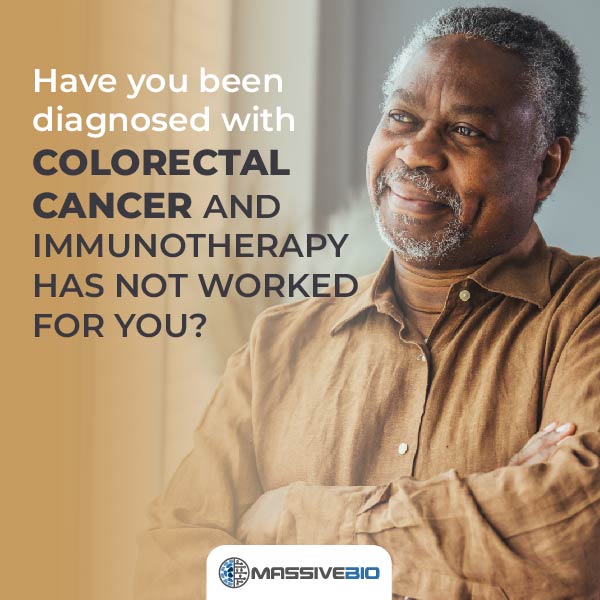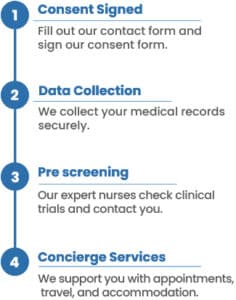News Massive Bio Has Onboarded Over 120,000 Cancer Patients To Find Their Clinical Trial
Clinical Trials in Colorectal Cancer


Compliant with

You can receive a guidebook with information about cancer clinical research by filling out the form.
The Most Recent Advances in Colorectal Cancer Treatment Options
Many people have questions about colorectal cancer, but there’s good news too. Our service helps you find and join the latest clinical trials for Stage 3 colorectal cancer and metastatic colorectal cancer. This gives patients a chance to try new treatments.
Our system links you with the latest clinical trials, helping those with colorectal cancer find new treatment options. We focus on providing detailed information about trials for every stage of the disease, especially for stage 3 and stage 4. These trials test new treatments that target the unique markers of your cancer. With our help, you have the opportunity to take an active role in managing your condition.
How our system works
After reviewing your medical records and running the information through our AI powered system, we identify clinical trials you may be eligible for. Not only that, we also provide a concierge service that will allow for a smooth transition into the clinical trial.
Our team of specialized nurses and physicians will make sure that every detail of your participation in the trial is taken care of before, during and after your enrollment.
All the services provided are completely free for you and your treating oncologist.
Understanding the disease
What is Colorectal cancer?
Colorectal cancer is a type of cancer that develops in the colon or the rectum, which are parts of the large intestine. It often starts as small, noncancerous (benign) clumps of cells called polyps that form on the inside of the colon. Over time, some of these polyps can become colon cancers. The main types of colorectal cancer are:
1. Adenocarcinomas: This is the most common form, making up about 95% of colorectal cancers. Adenocarcinomas start in cells that make mucus to lubricate the inside of the colon and rectum.
2. Carcinoid Tumors: These start from special hormone-producing cells in the intestine. Though less common, they are part of a group of diseases called neuroendocrine tumors.
3. Gastrointestinal Stromal Tumors (GISTs): These rare tumors start in a type of cell in the wall of the colon called the interstitial cells of Cajal. Some are benign; others are cancerous.
The type of colorectal cancer can influence both treatment and prognosis. However, most people with colorectal cancer have adenocarcinomas, and the general term “colorectal cancer” usually refers to this type.
What are the treatment options for
colorectal cancer?
Treatment options for colorectal cancer depend on the stage of the cancer, its location, and the overall health of the patient. Common treatments include:
1. Surgery:
• Procedures like polypectomy or endoscopic resection for early stages.
• Partial colectomy for more advanced stages.
• Low anterior resection or abdominoperineal resection for rectal cancer.
2. Radiation Therapy:
•Used before or after surgery, sometimes in combination with chemotherapy, particularly in rectal cancer.
3. Chemotherapy:
• 5-Fluorouracil (5-FU) and Capecitabine (Xeloda) are commonly used drugs.
• Administered after surgery to kill remaining cancer cells or before surgery to shrink tumors.
• Also used for advanced cancers to improve symptoms and prolong life.
4. Targeted Therapy:
• Drugs like Bevacizumab (Avastin), Cetuximab (Erbitux), and Panitumumab (Vectibix) target specific pathways or proteins in cancer cells.
• Mainly used for advanced colorectal cancer, especially if it has metastasized.
5. Immunotherapy:
• Drugs such as Pembrolizumab (Keytruda) and Nivolumab (Opdivo) are used for cancers with specific genetic markers.
• Effective particularly in advanced stages of colorectal cancer.
NGS testing and clinical trials
Next-Generation Sequencing (NGS) is vital in linking patients with specific genetic mutations in their cancers to clinical trials for targeted treatments. This approach, part of personalized medicine, increases the effectiveness and success rates of these trials by ensuring patients receive therapies most likely to work for their particular cancer type.
In colorectal cancer, certain genetic alterations are commonly observed, which contribute to the development and progression of the disease. Some of the key genes frequently altered in colorectal cancer include:
1. APC (Adenomatous Polyposis Coli): Mutations in the APC gene are among the most common genetic changes in colorectal cancer. They are especially prevalent in hereditary cancer syndromes like Familial Adenomatous Polyposis (FAP) and also occur in sporadic (non-hereditary) cases. APC mutations lead to uncontrolled cell growth.
2. KRAS: Mutations in the KRAS gene are common in colorectal cancer. These mutations lead to abnormal cell growth and division and are associated with resistance to certain targeted therapies.
3. BRAF: The BRAF gene, when mutated, can contribute to the growth of cancer cells. BRAF mutations in colorectal cancer, particularly the V600E mutation, are associated with a poorer prognosis and are important in treatment planning.
4. PIK3CA: This gene, when mutated, can activate pathways that promote cell growth and survival. PIK3CA mutations are seen in a subset of colorectal cancers.
5. TP53: TP53, often referred to as the “guardian of the genome,” is a tumor suppressor gene. Mutations in TP53 are common in colorectal cancer and are associated with the progression from a benign polyp to a malignant tumor.
The Role of Clinical Trials in
Colorectal Cancer
Clinical trials play a crucial role in the treatment of stage 3 and stage 4 Colorectal cancer for several reasons:
1. Access to New Treatments: Clinical trials offer patients a chance to try new treatments that could work better, especially for serious illnesses like advanced Colorectal cancer, where usual treatments might not work well.
2. Improving Outcomes: By participating in clinical trials, patients contribute to knowledge that could improve survival rates and quality of life for future Colorectal cancer patients.
3. Comprehensive Care: Patients in clinical trials often receive a high level of care and are closely monitored by a dedicated team of healthcare professionals and researchers.
4. Hope for the Future: For many patients with advanced Colorectal cancer, participating in a clinical trial provides hope—both for themselves and the possibility that their participation will help others in the future.
5. Advancing Research: These trials are essential for research, helping scientists understand how new treatments work and for whom they work best. This can lead to the development of more effective treatment strategies and personalized medicine.
We combine the power of technology with our dedicated team of medical providers to find you the best treatment options available.
Access the free matching toolHow Massive Bio Helps Patients With Colorectal Cancer
Massive Bio offers a quick, easy, and FREE way to find clinical research opportunities for patients like you. With our unique clinical research matching system and compassionate team, Massive Bio can rapidly match you to a clinical research study for those with colorectal cancer.
Talk to us. Our nurses and patient relations coordinators are here and happy to help you. You are not alone in this fight.
Call +1 844 627 7246What is a Myelofibrosis clinical trial?
Clinical trials test the latest scientific advancements in Myelofibrosis treatment. Patients who choose to enroll in trials can receive cutting-edge treatment and high-quality care under the direction of scientists, doctors, and researchers. Myelofibrosis patients might gain access to promising drugs and innovative treatments long before they're made available to the public.
What Are Clinical Research Studies?
Cancer is an unfortunate reality that touches most of us at some point in our lives. If you or a loved one has cancer, you may have heard or read that clinical research could offer access to potential new treatments. But what exactly is clinical research? In this video, Massive Bio co-founder Arturo Loaiza-Bonilla, MD, explains how clinical research studies work, what to expect if you enroll in one, and why clinical research can be an important treatment option for many cancer patients.
We dream of the day when cancer disappears from our lives. Massive Bio is working tirelessly to achieve on achieving that goal.
-
Who is Massive Bio?
Who is Massive Bio?
Massive Bio has helped to match cancer patients to clinical research studies of new oncology therapies. Massive Bio has helped more than 120,000 cancer patients in 25 countries across three continents.
-
What is the process?
What is the process?
To find the best clinical research studies for you, we need your medical history and consent. You can provide this consent by filling out the form on this page and the following pages. Once you complete that, our patient relations coordinators contact you to discuss the details and provide further information for clinical research matching report.
-
Why do I have to provide my medical records to enroll in a clinical trial?
Why do I have to provide my medical records to enroll in a clinical trial?
To enroll in a clinical trial, you must meet eligibility criteria that is established by the clinically trained researchers who are conducting the investigation. That includes detailed information about type of cancer, treatment history, response to treatment, and other data that is collected in medical records.
-
What should I do if I don’t have my medical records?
What should I do if I don’t have my medical records?
If you are being treated for cancer or any other disease, your doctor should have a complete record of your medical care, including specific information about what form of the cancer and stage of the disease you have and what treatments you have received. Your patient relations coordinator will contact you and inform you about the details and whole process.
-
What are the costs associated with Massive Bio’s services?
What are the costs associated with Massive Bio’s services?
Massive Bio provides its services to the patients and their doctors at no cost—you won’t have to pay anything to receive a clinical-research matching report. There are no hidden costs involved.
-
How does Massive Bio protect my personal information?
How does Massive Bio protect my personal information?
Massive Bio strictly adheres to all HIPAA guidelines and international regulations focused on maintaining your privacy. We take extra measures to secure your personal information, ensuring it is protected beyond the mandatory requirements.
-
Where can I find clinical research studies in my area?
Where can I find clinical research studies in my area?
Your doctor may know of a clinical research study being conducted in your area that’s recruiting participants and is right for you. However, Massive Bio uses its artificial intelligence-powered platform to match patients to clinical research studies of treatments that help find new ways of using already approved drugs and are being conducted in a geographical location that makes sense for you.
-
Can I continue seeing my doctor or oncologist while also taking services of Massive Bio?
Can I continue seeing my doctor or oncologist while also taking services of Massive Bio?
Yes, Massive Bio keeps your doctor up to date on your status throughout your participation.










